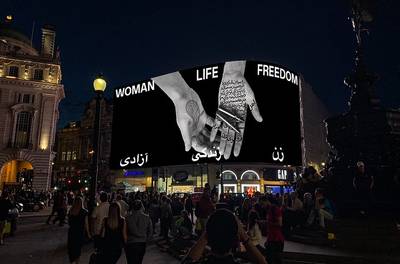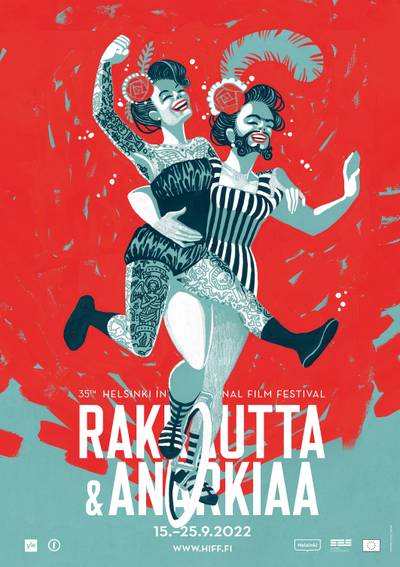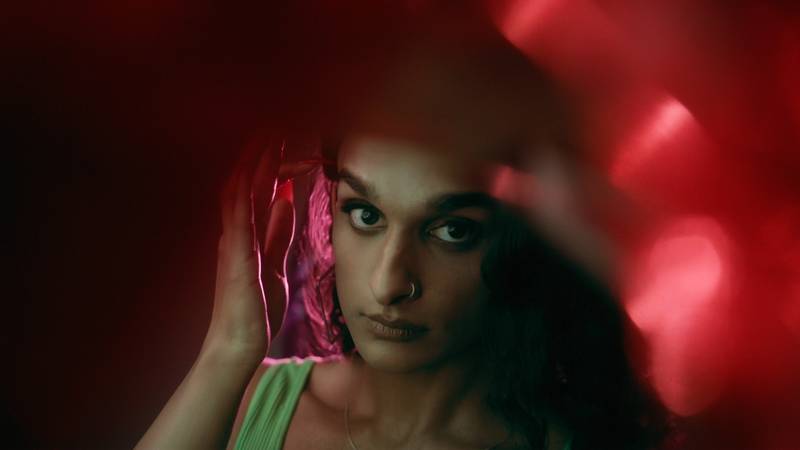

Portrait of Kinari
Bhumika Saraswati is a multiple award-winning journalist, filmmaker and photographer based in New Delhi, India. Her work has been published with various national and international organizations. She mostly works on long-term projects with a slower approach, currently indulged in documenting the unequal impact of Heat, and its intersections with gender, caste and climate crisis at Heat.Southasia, and second, documenting stories of women at the forefront of protest and resistance. Her work has been recognised with the UN-Laadli Media Award, Human Rights Press Award and RedInk Award for excellence in Indian Journalism.
Mithran R. T. Samuel (b. 1999) is a cultural producer and editor based in New Delhi, India. Their written work - essays, reported features and art criticism - has been in publications at home and abroad. They are in the process of expanding their critical and generative practice into research-based narrative soundscaping, while building a body of work exploring experimental public radio, liberation theology, and speculative fiction. Currently, they are also exclusively managing Kinari - Delhi’s first trans producer and rapper.
My introduction to Kinari at the launch event of her debut album KATTAR KINNAR was marked by palpable anticipation. Kinari entered the room adorned with golden nails and took stage – her energy radiating excitement mingled with nerves, underscored by an unmistakable resilience. Proudly parading her TOTO Music Grant trophy amidst the audience, she ignited a collective celebration of her artistry and the growing influence and transformative power of her music.
Kinari’s music is a radical sonic collision between her life in Delhi’s Khirki Extension in her lyrics and an intentional and intelligent reckoning with her Tamizh cultural and musical heritage through her use of parai drum beats, and gaan-inspired compositions. It is a raw and unflinching exploration of her life and is unapologetically transgressive. By blending streetwise lyrics with traditional rhythms, she creates a sound that is both familiar and revolutionary. Through her performances, Kinari unleashes truths through her rap lyrics.
Kattar
Kadwa sach,
Khirki band karo,
Let me talk my shit,
Sanskriti hai luxury…
***
Dihadi ka ye bhoj
Tabhi sapno mai hai salary
Laal batti soch,
Vo kahe isko dhanda
Mai kehti gig economy
Khushi Shaikh, who opened the event is an acclaimed dancer, model and viral sensation is arguably Kinari’s biggest inspiration. As a trans mujra dance, she carries on a rich tradition of entertainment that dates back to the Mughal empire, and is ubiquitous across the subcontinent. In the Western gaze, the Saim Sadiq-helmed film Joyland is the more familiar representation of this art form in recent years, despite its presentation is numerous Bollywood and Lollywood films in the past, albeit minus their autonomy or normalcy. In contrast, Khushi Shaikh has redefined the narrative by managing her own career, and leveraging social media platforms such as TikTok, Moj and YouTube, paving a path of agency and autonomy. Her iconic vlogs feature heavily throughout Kinari’s album, making her participation in the launch event a pivotal moment.
The meticulous coordination between Kinari and Khushi Sheikh was evident in their electrifying opening performance. Their spontaneity reflected their dedication, beauty and resilience. The energy pulsating through the venue that evening was revolutionary highlighting their dedication, and the beauty and resilience of their collaboration.
Khushi Sheikh’s electrifying performance of “Kayamat-Kayamat” showcased her energy and charisma. Usually we get to witness her only through the intimate glimpses of her Instagram reels. Seeing her LIVE on stage was a surreal experience that underscored the power of live performance. The crowd was mesmerised and their connection was palpable.
A poignant moment arose when Khushi acknowledged Kinari’s trailblazing contribution to the rap scene as the first trans rapper. As Khushi’s performance continued to captivate the crowd, her declaration WE ARE THE LUCKY ONES resonated deeply as a testament to the resilience and strength of the trans community. “Hum har kisi ke ghar paida nahi hote, we are the lucky ones.” Khushi’s words echoed a powerful reminder of the journey undertaken and the triumphs yet to come. The audience erupted in applause recognising the importance of visibility and representation of the the community.
The energy of the event was electric, a testament to revolutionary power of Kinari and Khushi’s performances. Together they shattered stereotypes and forged a path towards stronger foundation for transgender artists in the rap industry.


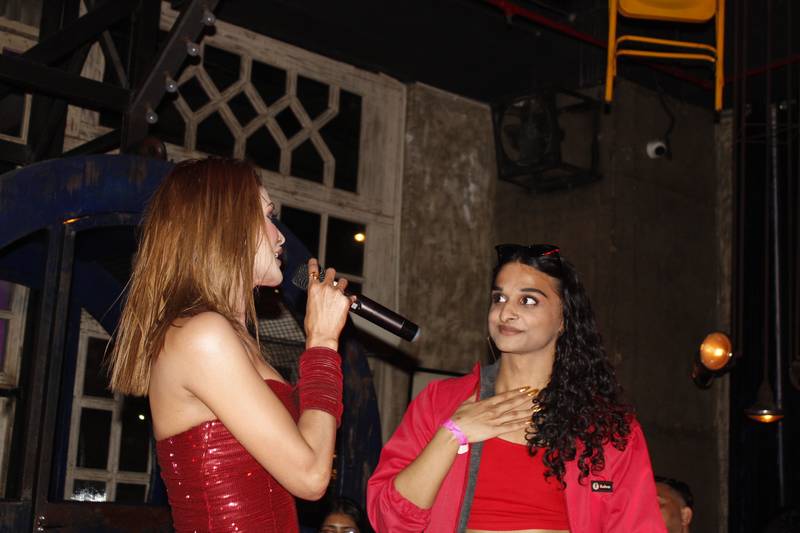

Khushi Shaikh and Kinari connecting at Mujrevali Madhuri | Photo by Sarthak Chauhan
Khushi Shaikh and Kinari connecting at Mujrevali Madhuri | Photo by Sarthak Chauhan
Planning the Historical Night
Kinari and her team began putting together her album launch event Mujrevali Madhuri around October 2023. That’s how long it can take to bring together funding, marketing plans, arrange collaborations, and get a venue on board for a massive show that involves an extended dance performance and a forty-five minute live rap set, with an audience of close to 200 people at a major venue.
“We could have aimed for a smaller, tighter gig, but it was important for us to have a certain level of gravitas and accommodate a big audience, mainly because we knew we wanted Khushiji to open for us” recounts Mithran R. T Samuel, Kinari’s manager and good friend.
Samuel and Kinari met a year ago, because Kinari used to listen to Samuel’s podcast Clear Blue Skies: Experiencing Ambedkar S1 while she was in college. They found that they shared an aesthetic sensibility, defined by high production standards, a stubborn desire to remain independent and uncompromising politics. They started working together out of frustration with the Indian hip-hop scene and New Delhi’s queer nightlife.
In June 2023, as part of Samuel’s residency at Khoj Studio, they tested out a trial version of the kind of parties they aimed to put on called ‘MEETHA WORLD: A Night Of Queer Festivities’. It was the first time either of them had ever put on a live gig, and it resulted in close to 300 people turning up and dancing for hours on end. Two months after that, Kinari asked Samuel to officially become her manager because it was clear that they had something incendiary in their hands, that could really blow up.
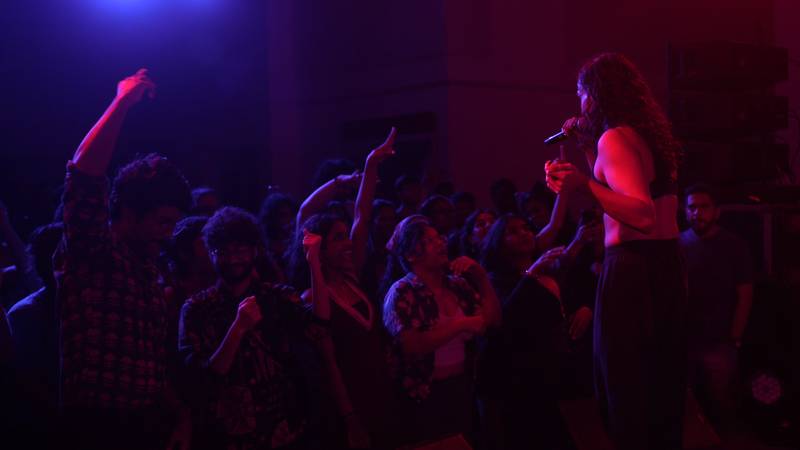

Kinari performing at the Goethe Institut in Bangalore as part of Maara Collective’s October Jam 2023 | Photo by Mahishaa (Neelavarna Productions)
Nine months and after more than ten gigs together, their focus sharpened into a clear vision: to produce and curate rap specifically for Delhi’s queer community and break into exclusionary spaces to create genuine connections and develop sounds and visuals of the undercity of the transsexual imaginary. That is the one place in which they have always been able to find, if not home, each other and who they’re meant to be.
The night of the launch was a magical culmination of months of hard work and it was joyous and sexy. From Khushi Shaikh’s dancing to old Bollywood item numbers to Kinari’s electrifying rap, from the audience’s enthusiasm captured in countless phone videos and video-calling family members, to the depth of emotion and the histories Kinari and Khushi Shaikh acknowledged and referenced, the experience was unforgettable. Atevery point, it was clear that this was a night to remember.
Kinari came up with the name Mujrevali Madhuri. “That’s what connects Khushiji and me” she explained. They both draw from, and play with the same canon of performance and artistry. Khushi’s mastery of her movement over her audience, whether in real life or on social media, can only come from deep study of the cultural context of what is means to be a trans entertainer in North India. For Kinari, it’s the knowledge of where she comes from and what she’s building, which is rooted in joy, community, and hard work, that is self-sustaining.
Making Rap Money in the Gig Economy
Kinari and her manager Mithran prioritize live shows over online streams or increasing views. It’s tough for everyone, let alone independent artists in the Global South, to make much money from online streaming. While the digital dimension is essential, but a live set is where you build loyalty among your fans and create life-changing experiences. The streaming numbers then follow. Our focus on generating consistent income from live shows and real-life fan interactions is crucial for sustainability and is also a good strategy.
“Visuals are also an essential part of the modern rapper’s playbook, but we both believe that they shouldn’t be prioritized over the quality of the music itself. Authenticity in content, even if it’s created using low-budget and DIY methods, can actually help make the music shine more because it keeps true to its roots, unlike a shallow VFX-laden spectacle. BAAHAR is the first single and the first music video from the album that we dropped. We shot it ourselves, from a combination of phone cameras, grainy old Sony handycams, a memorable Instagram Live session and gig footage from her first out-of-town show in Bangalore.”
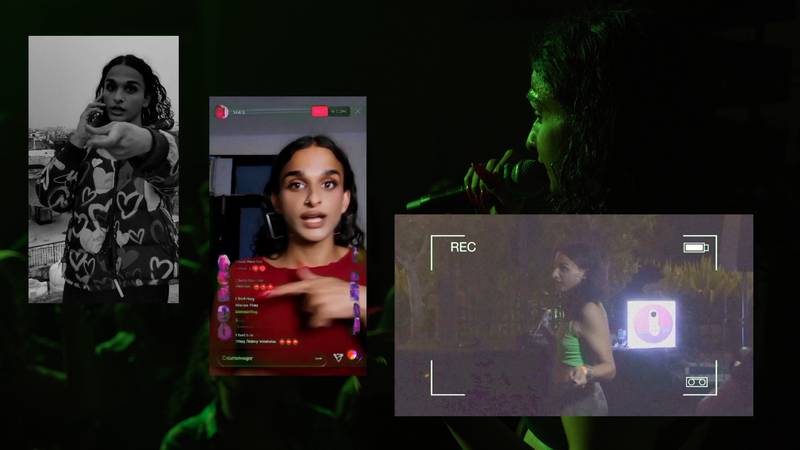

Still from BAAHAR, the first single to be released from KATTAR KINNAR
The song’s lyrics in BAAHAR reference the notorious “two-phone Baby Keem” refrain in her bars in the eponymous lyrics Rakhe 2 phone 1 mere haath me// (Two phones on me; one in my hand) and the editing reflects the homage to Kendrick Lamar and Baby Keem’s ‘family ties’ music video, with the layers of footage playing simultaneously and bleeding in and out of each other, highlight their connection to the global hip-hop scene. In Keem and Lamar’s imagery, the metaphor of gargantuan success in previously white-dominated fields is embodied by Black ballet dancers and is set against the gritty underpasses and diners with flickering lights echoing throughout. This juxtaposition is referenced in the music video for ‘BAAHAR’, where its visual layers switch and melt from Kinari’s life as a rooted member of Khirki, a local viral sensation and on stage, where she is always an undeniable star.
Bragging about stacks on stacks, decontextualised from where the heart of rap comes from, changes the freedom and community that rap can mean into pretentious, rampant consumerism. Paisevale kare show pe charche; Mere show pe aa k jhukte ladke// (Rich people doing discourse at shows; at my shows, these boys bow down).
It sounds obvious, but making money consistently is vital for long-term sustainability. It’s more reliable than social media virality, and this way, we also get to build constructive relationships with promoters, venue organisers and industry professionals. By focusing on live performances and building strong relationships within the industry, Kinari and Mithran are creating a sustainable model for their music career. This approach includes tending to their own platform Meethaworld IP, a queer-focused DJ night curated by Kinari curates and in which she sometimes plays under the moniker – DJ Nasbandi.
Pink (Saffron)Washing in India
A corporatised, pink-washed image of queerness is pervasive and has swiftly gained ground in India’s mainstream entertainment and consumer culture. This superficial acceptance does little to address the urgent needs na demands of the LGBTQIA+ community. Fundamental rights and ground-level asks are being consistently overrun and denied and few upper-caste, elite, Sanskritised speak for the many. This exoticisation and disenfranchisement – kind of a manufactured representation leads to a preponderance of diluted and whitewashed expressions of transness, shallow and homogenous.
Kinari stands in stark contrast to this pink-washing. She speaks her truth with clarity and with a cutting sense of humor.
While our cultural production doesn’t have political (read electoral) aspirations, it’s clear that we’re embodying an unavoidable reality and aspect of sub-alternality that isn’t often prioritised, particularly abroad.
Hip-hop emerged from marginalised communities, alongside DJs, and like the boombox culture of the 90s, it provided a platform for those who were unheard. While we draw from the sacred queer lineages of ballroom culture, Jeevan Productions is about rap. Despite the industry’s toxic hierarchical culture in terms of sexism, unchecked consumption and labour exploitation, rap can still disrupt norms by boldly and angrily re-imagining the present. It can be the people’s poetry, bloodsport without violence. We find kinship with artists like MC Stan, Rekoil Chafe, the Swadesi Movement, Pasha Bhai, Arivu, etc., and in their cheeky cheerful arrogance we locate ourselves. We are not interested in playing by the rules of the Indian rap scene and its gatekeepers. Instead we are determined to create and sustain our own transformative culture that is whip-smart, sexy and deeply political.
RSS chief Mohan Bhagwat had said in January that the lesbian, gay, bisexual and transgender (LGBT) community “should have their own private and social space as they are humans and have the right to live as others”. This brand of almost apoliticized tolerance is completely on-line with the public image that proponents of Hindutva want to spread. It’s one that lends itself well to corporatised manifestations of queerness because it separates itself from any kind of local context, political ideology or moral value-system other than a limited sense of civic rights.




Kinari on her terrace in Khirki Extension photographed by Sarthak Chauhan
Kinari at home, photographed by Sarthak Chauhan
Bitter Truth
In mainstream media and popular understanding, the trans quest for identity and its accompanying political aesthetics have been fetishised while the people who create it are constantly made invisible. Even in the so-called LGBTQIA+ community, this distortion is rampant. The fact remains that the most vulnerable and sub-cultural communities which fall under the larger trans umbrella are the skeletal structures underpinning the carcass of modern India’s body politics. But Kinari’s album is not a fleeting trend. KATTAR KINNAR is a raw and unflinching exploration of life on the margins. The album centres the undercity – the trannsexual-queers-bash-back-spit-and-blood-Delhi. It’s important and serious and reaches out to histories of struggle, of people who stood tall, alone and angry.

“This album is an expression of not just the meetha (sweet) side of being transgender but also the kadva sach (bitter truth). I want to share with people the pleasure and power of Tamil gaana and Delhi mujra dance throughout the album, which has helped me keep going.”
Kinaris music is a sonic collage. The album is a 12-track long-player in which KINARI’s beats intertwine with the joyful commotion of wedding bands outside her window, the coruscating pulse of gaana songs, and cuts of acclaimed Dalit director Mari Selvaraj’s films. Throughout the album, Kinari, a Tamil woman striving to succeed in North India, pays homage to the artistry of actresses like Rekha and Madhuri. She follows the grand tradition of classically trained Tamil performers who remade themselves into icons of vintage glamour and powerful femininity across the hearts and dreams of Hindi cultural production. It is a radical sonic collision between Kinari’s life in Delhi’s Khirki Extension and an intentional and intelligent reckoning with her Tamizh cultural and musical heritage.
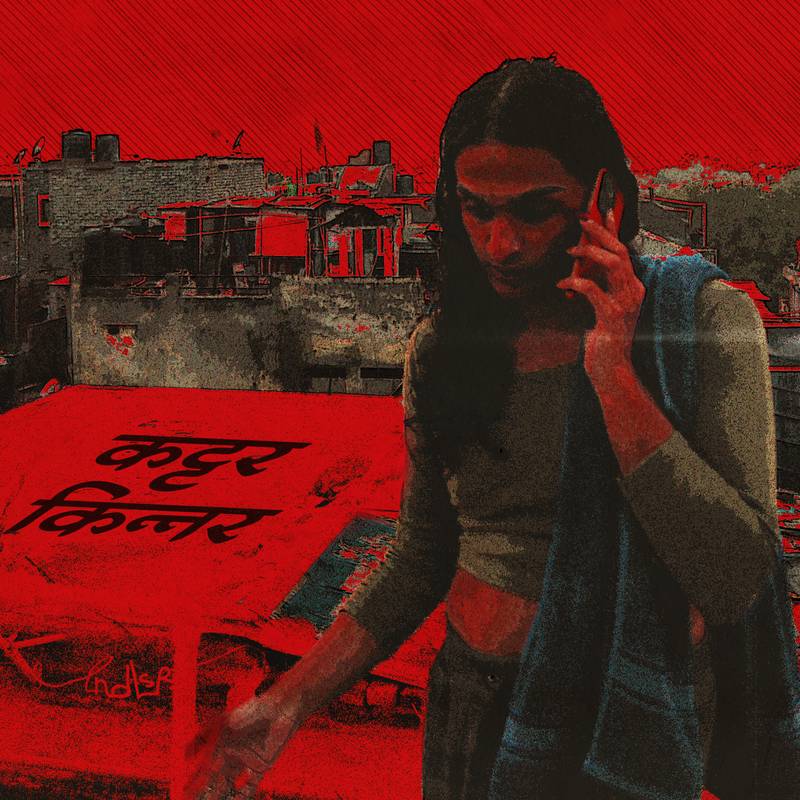

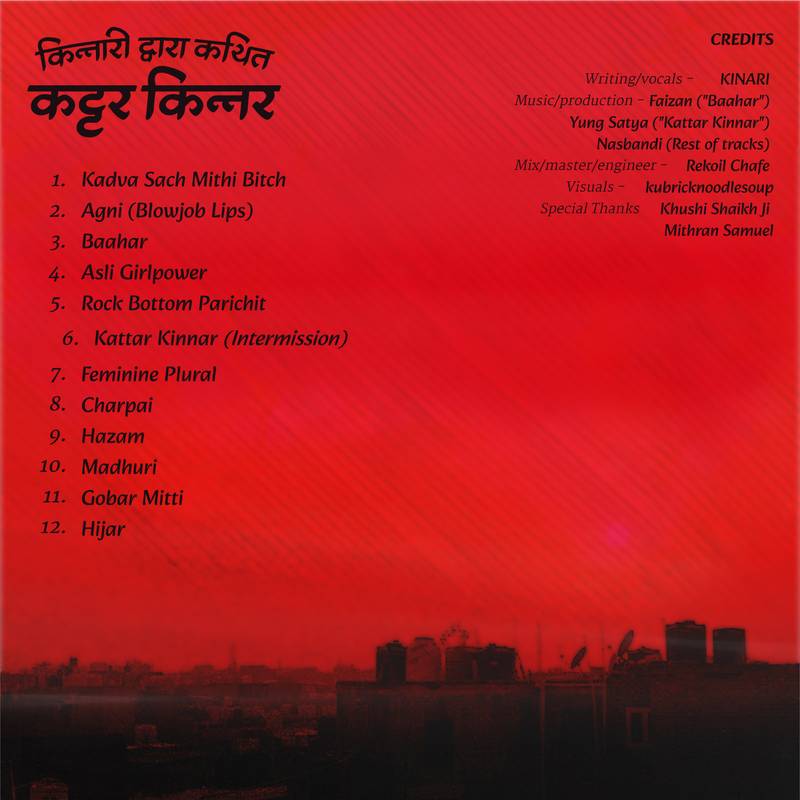

KATTAR MINNAR album cover | Art by Harman Singh | Photography by Sarthak Chauhan
KATTAR MINNARlist of tracks | Art by Harman Singh
The album’s opening track KADVA SACH MEETHI BITCH* (translation: Bitter Truth Sweet B*TCH), sets the tone for the entire project. Everyone acts like the trans experience is distant from their lives and realities when, in fact, it is nothing but the hard and bitter truth. Lal batti soch//Vo kahe isko dhandha//Mai kehti gig economy (Red light state of mind// They call this prostitution, I call it gig economy)”, raps Kinari in the introduction, neatly summing up the starkness of everyday life, right now. Tracks like BAAHAR is produced by Faizan, and the album’s interlude is produced by Yung Satya. The rest of the album is produced by KINARI’s long-time collaborator Nasbandi. It is mixed and mastered by Mumbai’s battle-cypher legend and erstwhile sound engineer, MC Rekoil Chafe.
Kinari says, “This album is an expression of not just the meetha (sweet) side of being transgender but also the kadva sach (bitter truth). I want to share with people the pleasure and power of Tamil gaana and Delhi mujra dance throughout the album, which has helped me keep going.”
Siddhesh Gautam, a Delhi-based artist, whose work focuses on social justice and documenting anti-caste histories. aptly describes the impact of Kinari’s music, “It felt emancipatory, not just because the art was good, but primarily because it carried a powerful political message that resonated deeply. When you attend an event in an elite space in a major urban city, the presence of politics within the art creates a sense of belonging. The art itself fosters this connection.”
Navigating the Waves of Indian and Asian Hip-Hop
As Kinari’s manager, I need to stay on top of global trends in music because they significantly influence festival bookings, venue deals, brand and sponsorship collaborations.
We’ve benefited from the surge of interest in Indian hip-hop, sparked by films like Gully Boy, which has created new opportunities, though the genre still faces challenges. Despite the film’s mainstream masala-ness, it had a commercial and cultural impact on how people saw, understood and appreciated Indian hip-hop.
Simultaneously, Asian hip-hop is experiencing explosive growth. Indonesia’s Rich Brian and the transatlantic success his collective 88Rising possesses, not to mention the TikTok virality and danceability of Japanese and Korean rap (alongside Jpop and K-pop), are leading this wave.
That’s why it’s crucial to recgnize the achievements of stars like MC Stan, Vijay DK, MC Altaf, and Arivu. On a domestic scale, that’s why what Pasha Bhai is doing with Dakhni, what Swadeshi Movement is trying to build, the kind of historical weight expressed in Koshur rap is so essential. Not to mention the mass initiatives that DIVINE spearheads with the Dharavi hip-hop project. The regionally and linguistically specific undergrounds that birthed the volatile, Hydra-headed, continuously growing entity that is Indian hip-hop should also get their piece of the pie.
Kinari’s album references in the intermission of the album. Track #6 produced by Delhi rap’s worst-kept secret Yung Satya – is a jewel-like collaboration and a perfect mid-way point through the Kattar experience. Yung Satya is a close collaborator of Kinari who has also produced some of her most complex/WORD songs, like ‘PURRRRR’ and ‘MEMORY FOAM HEELS’, from last year’s QUEERBOPS drop. He’s widely acclaimed for his production on the J-Block and Village Vigilantes helmed EP Loha Aur Chamda. Track #6, out of the whole album, straddles and questions the line of poetry and rap. The connection shared between Yung Satya and Kinari is one built on real solidarity and the huge commonalities of asli (real) hip-hop and what it means to be an “old-school queer”.
Ye bande gang gang bolte; living w their parents// Mehnge studio setup; Got it from their parents// Fir gaano pe bolte; “I made it cuz I have talent” (These boys talking gang gang; Living w their parents// Expensive studio setup; Got it from their parents// Then talking in their songs about’; “I made it cuz I have talent”).
After the album launch, the next time I saw Kinari perform, she radiated in hues of blue, donning a cobalt jacket, a matching top, and freshly painted nails echoing the same tranquil shade. This momentous occasion was the commemoration of Ambedkar Jayanti, celebrating the birthday of Dr. Bhim Rao Ambedkar held at Jawaharlal Nehru University in Delhi. The event, orchestrated by BAPSA, pulsated with talent, featuring the lyrical prowess of Mahi and Vipin Taptad alongside the electrifying melodies of the Zero Gravity band.
As Kinari stepped into the spotlight, cloaked in azure, all eyes fixated on her with eager anticipation. She seamlessly intertwined the presence of kinnars, the essence of Ambedkar, and the urgency of their recognition into her performance. Expressing her gratitude, she concluded her act with two words laden with significance—words for which many have faced persecution: Jai Bhim. Before her lyrical journey, she evoked the spirit of hip-hop and rap, highlighting their origins as vehicles of resistance within the Black community.
Addressing the politics surrounding performance art, Kinari challenged the norm, emphasizing the importance of appreciating and respecting bodies beyond the lens of misogyny, particularly when it comes to trans artists. Proud of her Tamizh heritage, she kicked off her set with “Rock Bottom Parichit,” igniting rhythmic movement among the audience. Although some may have yearned for more, Kinari’s performance was immortalized through the lenses of trans students, capturing her essence for a future documentary. Concluding her set with an unreleased track, DUA, Kinari encapsulated the profound role music plays in her life—a conduit for resistance and liberation, a testament to her journey and her unwavering spirit.
Kinari performing at Mujrevali Madhuri: KATTAR KINNAR album launch at Nehru Social, Delhi on March 3, 2024 | Video by Bhumika Saraswati | ‘Charpai’ from KATTAR KINNAR
Kinari performing at Mujrevali Madhuri: KATTAR KINNAR album launch at Nehru Social, Delhi on March 3, 2024 | Video by Bhumika Saraswati | Memory Foam Heels - a song that Kinari released under her previous artist name ‘Finsta’



